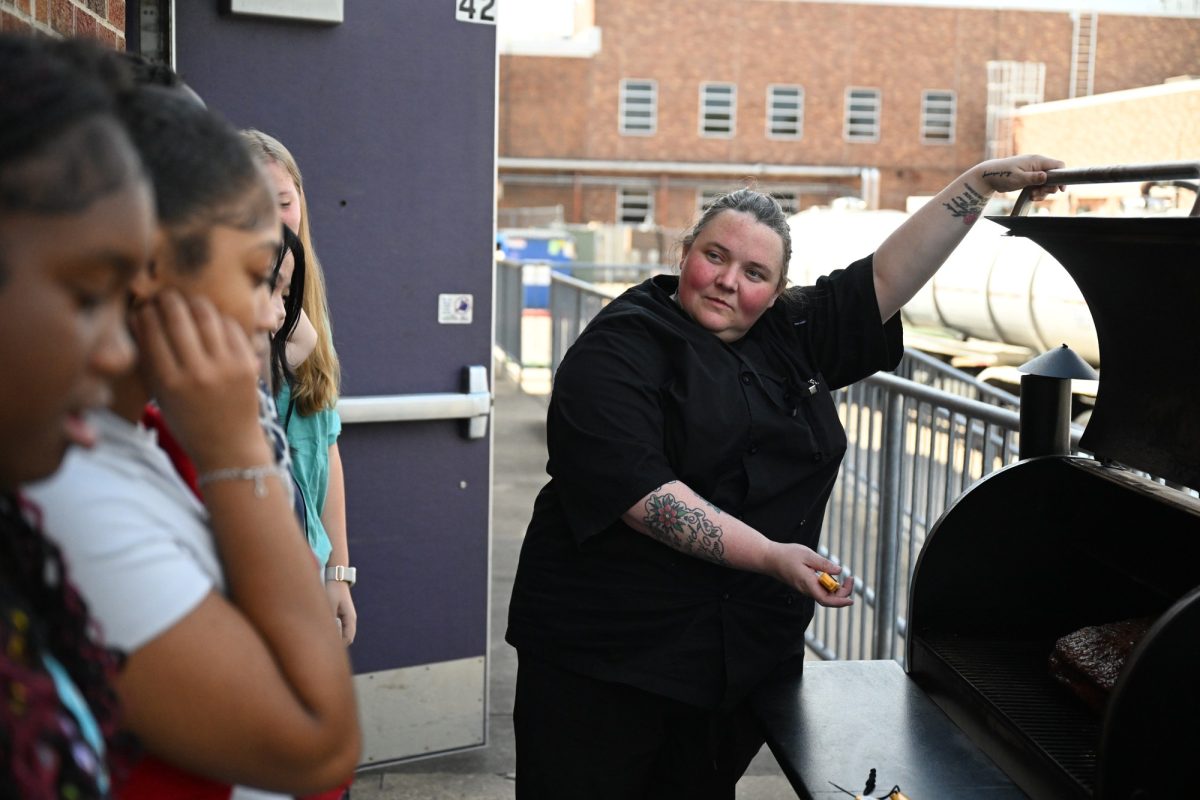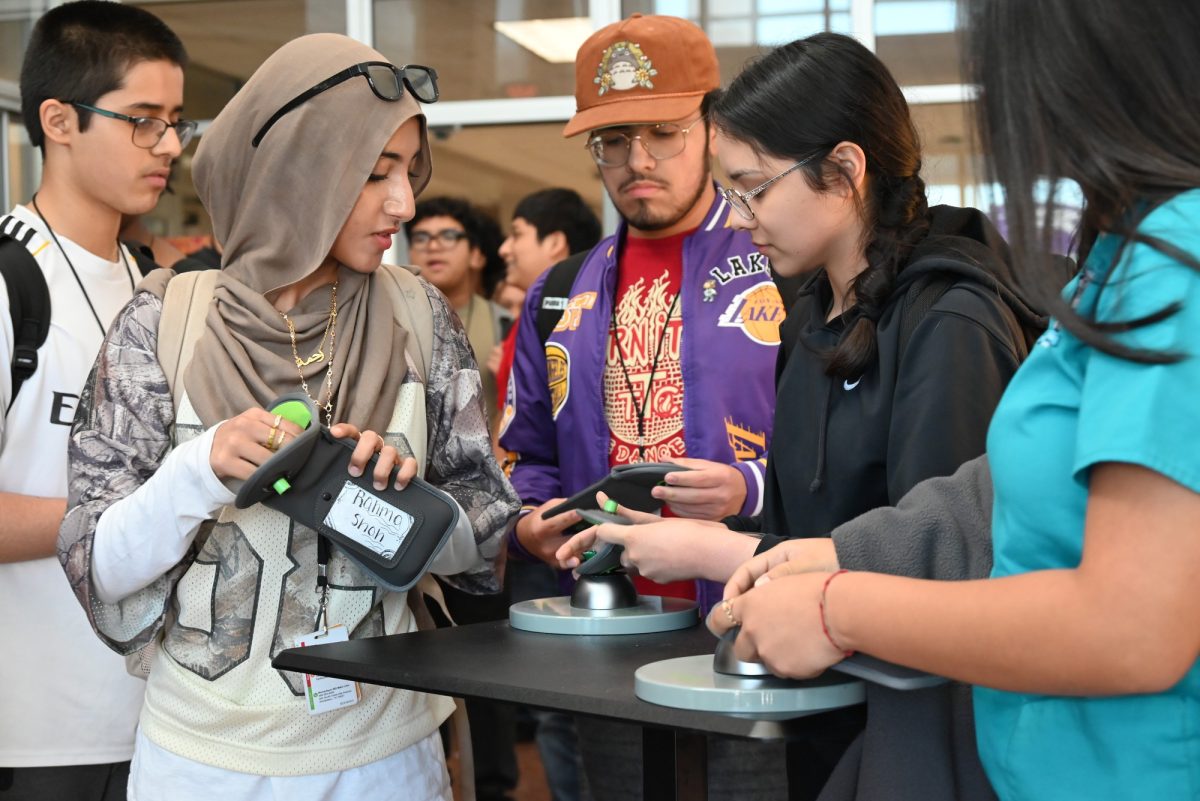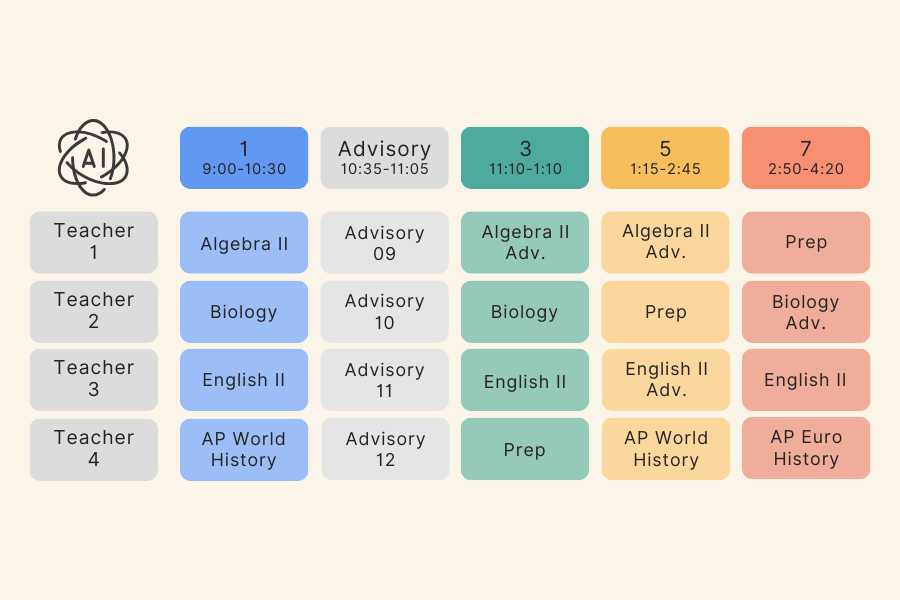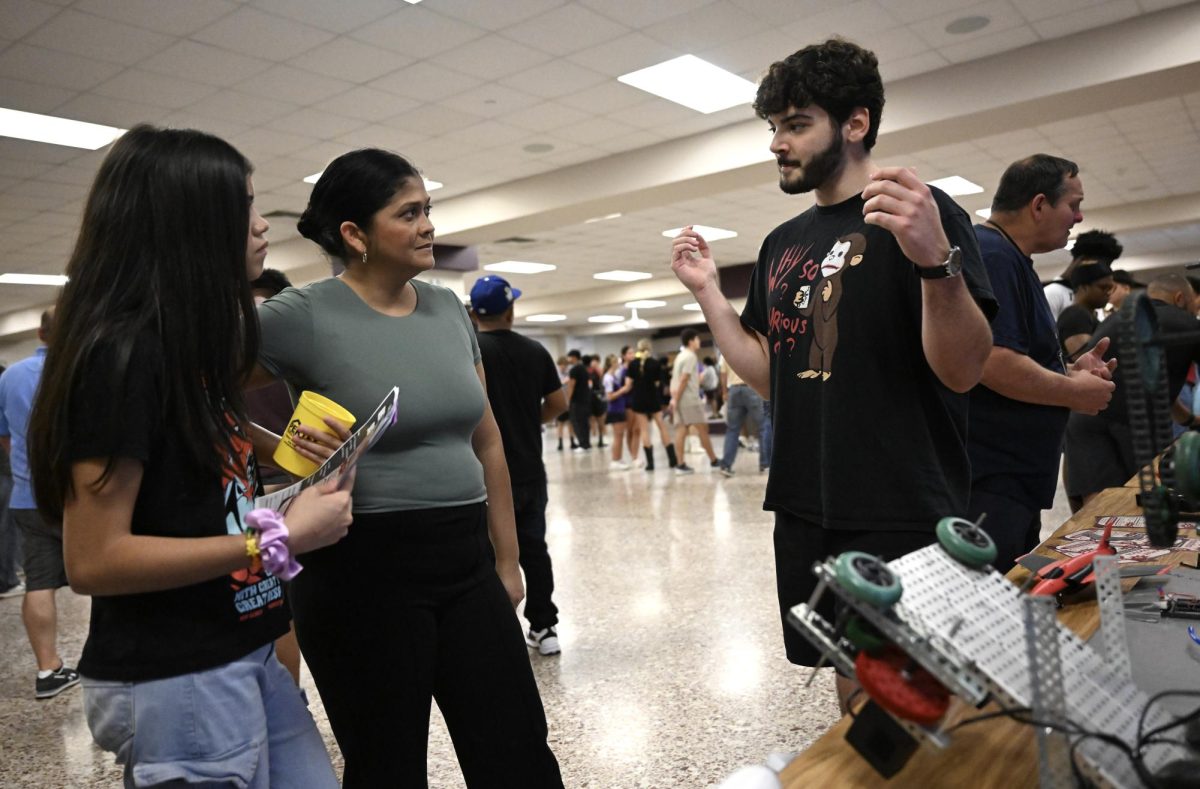Following the passage of Texas Senate Bills 12 and 13, which expand parental rights in education, RHS has updated its policies on clinic procedures, club infrastructure, books and the way students are addressed.
SB12 requires parents to opt their child into health services as well as school clubs and organizations. The bill also bans student clubs based on sexual orientation or gender identity, and prohibits teachers from supporting students in gender transitions, including calling students by a name different than their legal name.
SB13 requires districts to offer an opt-in notification system allowing parents to see each book their child checks out from the school library. The bill also shifts authority over approved book from librarians to school boards or Local School Library Advisory Council.
“The whole purpose of it is so that parents know what their students are involved in and that they’re given permission for them to be involved in certain things,” Principal Chris Choat said.
Per SB12, the district decided to create an opt-in system through Focus where parents can choose whether their child receives health services, be a part of clubs or see what books their child checks out from the library.
Focus was chosen as the primary platform, because it was the most accessible platform to parents. However, they also provided paper copies to the campuses for families who may not use Focus regularly.
Health services can include receiving a bandaid, but students can only access them if their parents have opted in. Now when a student comes down to the clinic, the nurses have to look them up in Focus and see if they have a green icon next to their name, indicating they’ve opted in.
If a parent has opted out, the district asked nurses to contact them to ensure they understand what they have opted out of.
However, students who are not opted in can still receive emergency care at the clinic.
Choat said if someone comes into the clinic with a medical need or is facing a mental health issue where their safety is in jeopardy, they’re going to be treated. If it’s not urgent, the nurses will simply have a conversation with the student and call their parents afterwards.
“If there’s an immediate need where that student’s safety is in jeopardy, we’re still going to do what’s right by the student,” Choat said.
Nurse Jennifer Gaylor said it’s sometimes difficult to get parents to fill in the opt-in form, because they may not have access to technology, and even if they get a paper copy in their own language, some parents can’t read or write.
“You want to help student but it’s a matter of getting those consent [forms] signed and having the parent understand that language when they don’t have access to a lot of things like technology,” Gaylor said.
Therefore, Gaylor and the other nurses have been taking leads from their department and legal team to work out solutions, while the administration continues to send reminders to parents to opt in.
Before SB12, the consent form for health services was part of the enrollment process for students, but it had to be changed because it didn’t match the required wording. However, Gaylor said next year the opt-in form will be a part of the enrollment process, which will make it a lot easier for the clinic.
“This is really the only year that it’s going to be a little bit difficult, a little bit tedious from now on,” Gaylor said.
She said clinic procedures now take much longer because they must check whether the student is opted in, which keeps them out of class longer. Calling parents to ask permission for basic health services can prolong the visit to 15 to 20 minutes when it should normally take five.
If a parent gives permission through the phone or Talking Points, the nurses able to treat the student for that one visit. However, for future visits, the student would need to be opted in. The nurses end up contacting parents 10 to 15 times a day to obtain their consent.
Assistant principal Bill Parker said SB12 has “completely redefined and revamped” how clubs and organizations are structured and monitored because of the new opt-in system.
There was a temporary freeze on clubs during the beginning of the school year so Parker and the administration can get the new system in place. On September 5, they lifted the freeze and allowed students to reinstate and create their clubs for the next 10 days.
Black Student Union Co-President Serenity Hogg said the temporary freeze forced many clubs to push back their schedules, as they had already posted announcements and planned meetings.
“It really just slows the schedule down for all the clubs, and it makes time shorter for us,” Hogg said.
Parker said the only difference under SB12 is language regarding sexual orientation and gender identity in the club’s purpose, which can disqualify them from existing. As a result, the Straight and Gay Alliance club will no longer be allowed, and its organizers are exploring ways to restructure and continue supporting students while remaining in compliance with state law.
On the other hand, clubs with a cultural identity aren’t prohibited and will still exist.
There will now be a “fluid opt-in” system where the district updates the list of clubs quarterly. Parker and the administration used the clubs from last year as a starting point and will now see which ones need to be added, reactivated or disbanded after September 15.
“The important thing about our high school is that we let students drive the clubs,” Parker said. “Students say we want a club, they go find a sponsor, they fill out the paperwork, follow the rules and the club exists.”
Parker said teachers now have to monitor which students are participating in their club and whether they are opted in, which gives them an extra burden. But they are still determining how to handle the back-end verification of those permissions.
Hogg said the new opt-in system is frustrating because now they have to take extra precautions just for students to have a community and a space for them to express themselves and connect with others.
She said she’s also concerned that BSU may see lower membership this year, as some students might be unwilling to sit down with their parents to go through the opt-in process or may simply forget to do so.
“It’s definitely going to make things a bit harder on us,” Hogg said.
Parker said he thinks SB12 and the opt-in system could be a barrier for students to participate in clubs, and one of the most important things educators can do is remove barriers to learning.
“With any sort of restrictive requirement, I think we’re only as good as the unintentional consequences of the decisions we make,” Parker said.
Parker said SB12 is going to change how they approach clubs, organizations and its infrastructure. Once they figure it out and build processes to follow the bill, he thinks it will become the new normal and everyone will be able to adjust.
“But right now it’s kind of an in-between period where where we’ve got to figure out what it’s going to look like and what concerns,” Parker said.
Under SB13, parents can now choose how much they want to be notified when their child is checking in or out a book.
The district decided to establish a School Library Advisory Council in October per SB13 where an oversight group of community members, teachers and administrators help guide the decision making process for library media services.
The librarian shared information about which books are allowed in the library or classrooms at a faculty meeting with the staff. Some books that would be considered mature were allowed in the past but aren’t now due to SB13. Now, teachers are only allowed to use what’s in the library or what the district provides.
AP U.S. History teacher Samuel Mount had to remove some books he had for planning purposes because they weren’t on the approved list. He was told that generally if a book is not already in an RISD library, then it would not be considered an approved text.
Mount said the restrictions affected his teaching because he has concerns about sharing material that are from unapproved books and whether or not that will become a problem for him.
“I try really hard to present history accurately and without my own editorializing and I’ll continue to do that,” Mount said.
The administration is monitoring the opt-in list and are making sure parents are filling out the forms. The district sent out emails about the new system and Choat is running it in his weekly newsletter that goes out to parents, students and staff. Eventually, they will see which students don’t have the form filled out and reach out to those specific parents.
The staff attended presentations on the new legislation during the week before school started. For SB12, they held a 90-minute session over what the bill states and opened a FAQ for teachers. Based on teachers’ feedback, Choat addressed what if scenarios and answered questions so everyone had a clear understanding.
“Now our teachers know that if they get in a situation, they recall from the presentation and the training that I did with them,” Choat said.
Choat said he still gets emails from teachers and assistant principals clarifying what they can and cannot do under the new laws because they all want to be transparent.
Another major aspect of the bill is students who have nicknames or preferred names. Teachers asked Choat when it would be acceptable to call a student by a different name, and he explained that they may use shortened versions of a student’s legal name when it makes sense.
“What it boils down to is if a student is going through a scenario where they are transitioning, the bill tells us we’re not supposed to affirm that,” Choat said.
Mount said that aspect of the bill affects him the most as a teacher because he has several students who have names that don’t correspond with their gender.
“It’s difficult because legally I’m not allowed to call that student by that name, even if it represents their identity,” Mount said.
Therefore, he would have to let those students know about the state law and that he can only call them by their biological name.
Senior Anjali Solanki, who goes by “Moss,” said this clause is not fair because while they’re trying to go against trans and queer students, it also affects students who go by middle names and nicknames.
“It’s affecting a lot more people than what they think,” Solanki said.
Solanki said the new law hinders the school’s ability to be as accepting as it has been in the past. Now, teachers are understandably worried about losing their jobs.
Solanki said SB12 is not protecting anyone and instead makes students’ lives harder because they have to go to a school where their deadname is being constantly used. She said it’s upsetting and distracting from their schoolwork.
“That’s not a fun environment to be in,” Solanki said. “That doesn’t make you feel happy [and] doesn’t make you want to come to school.”
Mount had to take down the Pride flags that were in his classroom because it violated SB12’s clause about teachers prohibited to support gender transitioning.
“I did make the decision to take those down just because if I’m not here because of legal problems then I can’t be here for my students,” Mount said.
Instead, he hung posters explaining the state law and how the Pride flags were in violation of it.
Mount said he believes it’s important for students to understand how the law can impact them and how it works in our state. Therefore, he made sure the poster’s language wasn’t expressing his personal opinion and just communicated the relevant parts of SB12.
“I try not to go into my own personal feelings about it just because I want them to make those decisions for themselves,” Mount said.
He said there are still a lot of things that are unclear with the law, but the administration told teachers they will communicate any updates or clarifications. Overall, it has created more uncertainty than clarity, partly because many questions cannot be answered even by the bill’s framers.
“I’m hopeful that as time goes on, we’ll get more clarification and things will be clearer,” Mount said.
Choat said teachers need to understand how they can support a student when one comes up to them with concerns without breaking SB12.
“It’s just understanding how to support those students that need it without just sending a message to them [saying] ‘Well, I’m sorry we can’t do that because it’s the law,'” Choat said.
Choat said the timing of the legislation has been challenging for them because it was passed just a few weeks before school started. It was a quick turnaround for them to get these new policies implemented before students returned.
“It’s really hard to understand a huge piece of legislation and a short amount of days,” Choat said. “So I think that’s something that we’re still going to continue with understanding and growing through this whole year before everybody really understands.”







